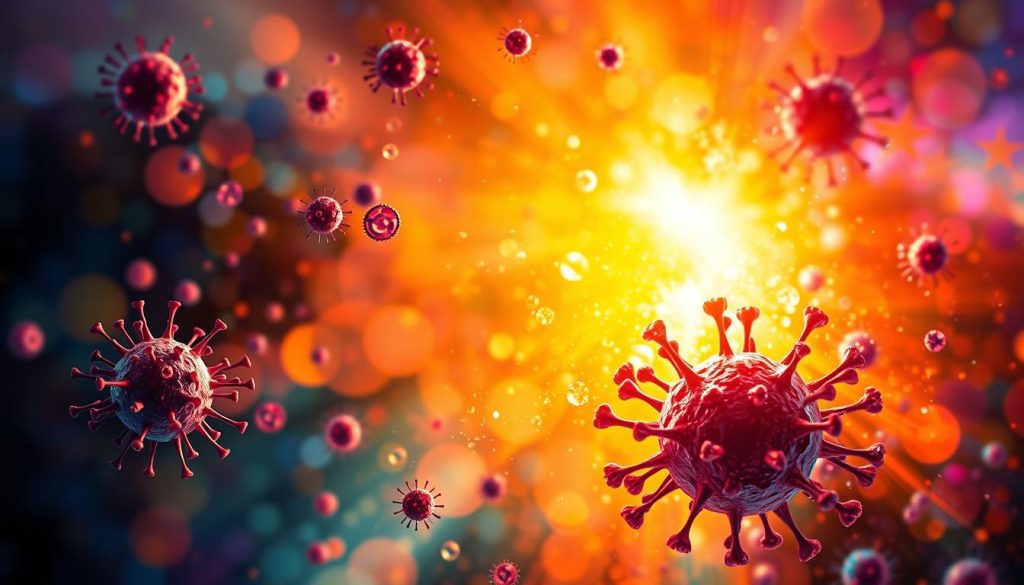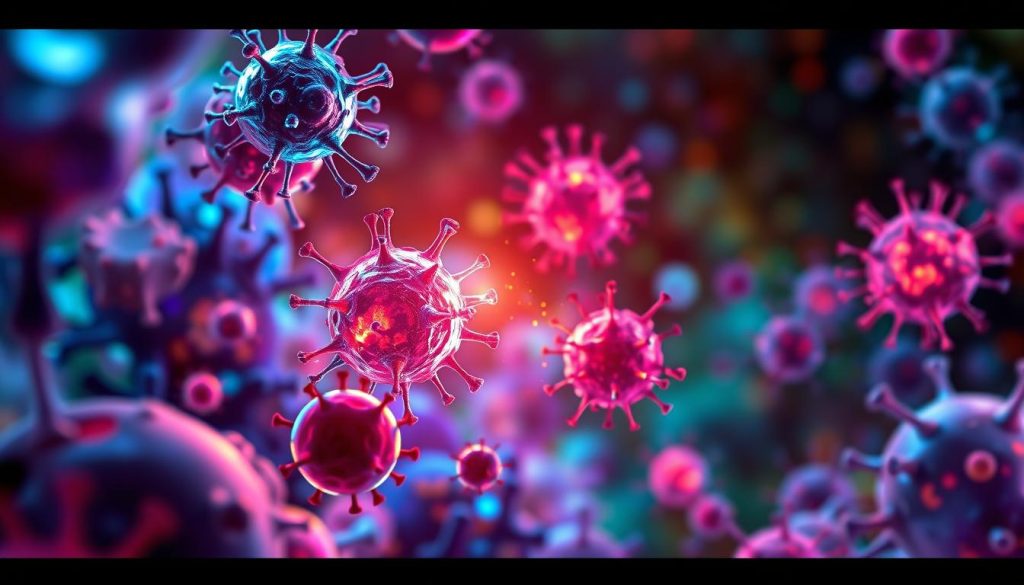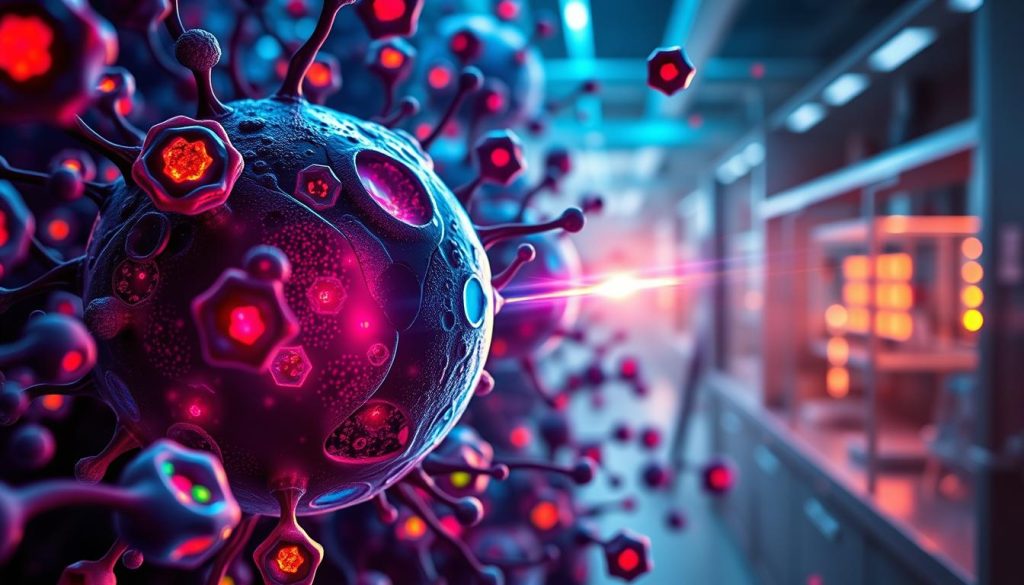CAR T-cell therapy is changing cancer treatment. It uses the body’s immune system to fight cancer. This therapy has shown great promise in helping patients with hard-to-treat cancers.
This treatment works by making a patient’s T-cells attack cancer cells. First, T-cells are taken from the patient. Then, they are changed in a lab to target cancer. After that, these enhanced T-cells are put back into the patient to fight cancer.
Research on CAR T-cell therapy is growing. It has led to better survival rates and long-term remissions for some patients. We will look into how well this therapy works, what affects its success, and its future in cancer treatment.
Understanding CAR T-Cell Therapy
CAR T-cell therapy is a new way to fight cancer. It uses a patient’s own immune system. This method changes a patient’s T lymphocytes to attack cancer cells better.
How CAR T-Cell Therapy Works
The therapy starts with taking a patient’s T cells. This is done through a process called leukapheresis. Then, these cells are changed in a lab.
The change adds a special receptor to the T cells. This receptor helps them find and destroy cancer cells.
After the T cells are modified, they are grown in the lab. Millions of these cells are made to fight cancer. They are then given back to the patient.
These cells go after and kill cancer cells with the right antigen.
Types of CAR T-Cell Therapies
There are different CAR T-cell therapies for various cancers. Some are for blood cancers like:
| Therapy | Target | Approved for |
|---|---|---|
| Kymriah (tisagenlecleucel) | CD19 | Acute lymphoblastic leukemia, large B-cell lymphoma |
| Yescarta (axicabtagene ciloleucel) | CD19 | Large B-cell lymphoma |
| Tecartus (brexucabtagene autoleucel) | CD19 | Mantle cell lymphoma |
Researchers are also working on therapies for solid tumors. These include cancers like breast, lung, and colorectal. They aim to tackle the challenges of solid tumors.
“CAR T-cell therapy represents a significant advancement in personalized cancer treatment, giving hope to patients who have tried everything else.” – Dr. Sarah Johnson, oncologist
Promising Results: CAR T-Cell Therapy Survival Rates
CAR T-cell therapy is making waves in treating blood cancers. It gives hope to those who’ve tried everything else. With high remission rates and long survival times, it’s changing cancer care.

Studies show CAR T-cell therapy works well for acute lymphoblastic leukemia (ALL). Remission rates can hit 90% in some trials. This has led to FDA approval for ALL, helping those who’ve failed other treatments.
Survival Rates for Different Cancer Types
CAR T-cell therapy is also showing promise for other blood cancers. For diffuse large B-cell lymphoma (DLBCL), remission rates are 40% to 60%. In multiple myeloma, early trials show up to 90% response rates.
These numbers show CAR T-cell therapy’s power in treating blood cancers. As research grows, it’s likely to help more cancer types. This brings hope to those with few treatment options.
Long-term Remission and Survival
One key benefit of CAR T-cell therapy is long-term remission. Some patients stay cancer-free for years. This suggests it could be a cure for some.
“CAR T-cell therapy has given me a second chance at life. After battling lymphoma for years and facing limited options, this treatment has put me in remission, and I am grateful for every day I have with my loved ones.” – Sarah, CAR T-cell therapy recipient
The long-term survival benefits of CAR T-cell therapy are huge for aggressive cancers. It uses the immune system to fight cancer. This offers a lasting solution, giving hope to patients and their families.
Factors Influencing CAR T-Cell Therapy Success
The success of CAR T-cell therapy depends on many factors. These include the patient’s health, the type of tumor, and past treatments. Knowing these factors helps decide if a patient can get this new treatment.
Patient factors that can impact CAR T-cell therapy success include:
- Age and overall health status
- Immune system function
- Presence of comorbidities
- Ability to tolerate possible side effects
Tumor characteristics also affect how well CAR T-cell therapy works. Important factors include:
| Tumor Factor | Impact on CAR T-Cell Therapy |
|---|---|
| Tumor burden | Higher tumor burden may reduce treatment efficacy |
| Antigen expression | Consistent antigen expression is key for CAR T-cell targeting |
| Tumor heterogeneity | Heterogeneous tumors may need multiple CAR T-cell targets |
Pre-treatment factors, like past therapies, also matter. Patients who have tried many treatments or have resistant cancers might face challenges. Yet, CAR T-cell therapy has shown promise for these cases.
The beauty of CAR T-cell therapy is that it can offer hope to patients who have exhausted other treatment options.
Oncologists can pick the best candidates for CAR T-cell therapy by looking at patient and tumor factors. They also consider past treatments. This helps make treatment outcomes better.
CAR T-Cell Therapy in Clinical Trials
Clinical trials are key in making CAR T-cell therapy better. They test this new treatment in many cancers. The goal is to make it safer and more effective, helping more patients live longer and better lives.

Ongoing Clinical Trials and Their Impact
Scientists are studying CAR T-cell therapy in blood and solid tumors. Some important trials include:
- ZUMA-1: Looks at axicabtagene ciloleucel (Yescarta) for tough-to-treat large B-cell lymphoma
- ELIANA: Studies tisagenlecleucel (Kymriah) in kids and young adults with B-cell ALL
- JULIET: Examines tisagenlecleucel in adults with DLBCL that didn’t respond to other treatments
These trials show great promise, with many patients seeing long-lasting benefits. The FDA has approved CAR T-cell therapies for some blood cancers. This means more people can get this life-changing treatment.
Eligibility Criteria for CAR T-Cell Therapy Trials
To join CAR T-cell therapy trials, patients must meet certain criteria. These rules help keep everyone safe and ensure the trials are useful. Common criteria include:
| Criteria | Description |
|---|---|
| Age | Varies by trial, typically 18 years or older |
| Cancer type and stage | Specific to the trial, usually relapsed or refractory disease |
| Prior treatments | Must have received standard therapies without success |
| Performance status | Adequate organ function and overall health to tolerate treatment |
If you’re interested in CAR T-cell therapy trials, talk to your doctor. They can check if you qualify and help you find the right trial. As research grows, more people might get to try this promising treatment.
Patient Experiences with CAR T-Cell Therapy
As CAR T-cell therapy changes cancer treatment, it’s key to see its impact on patients. It’s not just about survival rates and long-term remission. The emotional well-being and quality of life of those undergoing this treatment are also vital.
Success Stories and Testimonials
Many patient stories highlight CAR T-cell therapy’s success. Emily Whitehead, for instance, was diagnosed with acute lymphoblastic leukemia at 5. After trying all other treatments, she got CAR T-cell therapy. Now, over a decade later, she’s cancer-free and thriving, inspiring hope for others.
“CAR T-cell therapy gave me a second chance at life. It’s incredible to think that my own immune system was able to fight off the cancer and keep me healthy for so many years.” – Emily Whitehead, CAR T-cell therapy survivor
Quality of Life After Treatment
While CAR T-cell therapy aims to eliminate cancer, it’s also about patients’ quality of life after. Many survivors see a big boost in their emotional well-being and health after treatment.
| Quality of Life Aspect | Before CAR T-Cell Therapy | After CAR T-Cell Therapy |
|---|---|---|
| Physical Health | Compromised due to cancer and side effects of conventional treatments | Improved, with many patients experiencing long-term remission |
| Emotional Well-Being | Stress, anxiety, and fear associated with cancer diagnosis and treatment | Increased sense of hope, relief, and gratitude for successful treatment |
| Social Functioning | Limited due to frequent hospital visits and treatment-related fatigue | Enhanced ability to engage in social activities and enjoy time with loved ones |
Success in CAR T-cell therapy goes beyond physical health. It lets patients take back their lives and feel emotionally better. Support from family, friends, and healthcare teams is key in overcoming cancer treatment challenges and embracing survivorship.
Comparing CAR T-Cell Therapy to Other Treatments
When looking at cancer treatments, patients and doctors often compare CAR T-cell therapy to other options. Traditional treatments like chemotherapy, stem cell transplants, and targeted therapy have long been used. But CAR T-cell therapy is seen as a new, promising choice with its own benefits.
Advantages of CAR T-Cell Therapy
One big plus of CAR T-cell therapy is its chance to give long-term remission to patients who’ve tried other treatments. It uses the patient’s immune system to attack and kill cancer cells. This can lead to lasting results. Also, CAR T-cell therapy might have fewer side effects than chemotherapy and stem cell transplants. It targets cancer cells more precisely, leaving healthy cells alone.

The table below shows some key benefits of CAR T-cell therapy over other cancer treatments:
| Treatment | Specificity | Durability of Response | Potential Side Effects |
|---|---|---|---|
| CAR T-Cell Therapy | High | Long-term remission possible | Cytokine release syndrome, neurological toxicities |
| Chemotherapy | Low | Short-term response | Widespread, affecting healthy cells |
| Stem Cell Transplant | Moderate | Variable, risk of relapse | Graft-versus-host disease, infections |
| Targeted Therapy | High | Variable, resistance may develop | Specific to targeted pathway |
Limitations and Challenges
Even with its promise, CAR T-cell therapy has its own challenges. A big risk is cytokine release syndrome (CRS), a serious condition caused by an overactive immune response. It’s vital to closely watch for CRS and manage it quickly to keep patients safe. Also, how long CAR T-cell therapy works is something researchers are studying. Some patients might see their cancer come back over time.
“CAR T-cell therapy is a big step forward in personalized cancer treatment. But it’s important to consider its benefits and risks. Patients and doctors need to talk openly to make the best treatment choices.”
As research keeps improving CAR T-cell therapy, it’s likely to become a more important tool against cancer. It offers hope to those who’ve tried other treatments without success.
Side Effects and Management of CAR T-Cell Therapy
CAR T-cell therapy has shown great success in treating blood cancers. But, it can also cause serious side effects. Two major issues are cytokine release syndrome (CRS) and neurological problems.
CRS happens when the immune system overreacts, releasing many cytokines. Symptoms can be mild, like flu, or very serious, like organ failure. These include:
- High fever
- Low blood pressure
- Difficulty breathing
- Organ dysfunction
Neurological side effects can cause confusion, tremors, seizures, and headaches. These symptoms might be short-term or could last a long time.
Doctors closely watch patients getting CAR T-cell therapy. They use supportive care to manage side effects. This includes:
| Side Effect | Management Strategy |
|---|---|
| Cytokine Release Syndrome | Anti-inflammatory medications, such as tocilizumab or corticosteroids |
| Neurological Toxicities | Anti-seizure medications, supportive care, and close monitoring |
| Infection | Prophylactic antibiotics and careful infection control measures |
“The key to successfully managing side effects lies in early recognition and prompt intervention,” emphasizes Dr. Sarah Johnson, a leading oncologist specializing in CAR T-cell therapy. “By closely monitoring our patients and providing complete supportive care, we can help them overcome treatment challenges while enjoying its benefits.”
Many patients and their families believe the benefits of CAR T-cell therapy are worth the risks. As research improves, ways to lessen and handle these side effects are getting better. This gives hope for safer, more effective treatments in the future.
Advancements in CAR T-Cell Therapy Technology
The field of CAR T-cell therapy is growing fast. Researchers are working hard to make treatments better and solve problems. They are using gene editing to create new CAR T-cell therapies. These new therapies are safer and more powerful.
Gene editing tools like CRISPR-Cas9 are being used to improve CAR T-cells. By changing specific genes, scientists can make these cells work better. For example, they can make CAR T-cells safer or more effective against tumors.
Next-Generation CAR T-Cell Therapies
New CAR T-cell therapies aim to fix old problems. They might have extra features to make them safer. Scientists are also working on CARs that can target more than one tumor antigen at a time.
Another big step is the creation of off-the-shelf CAR T-cells. These cells are made from healthy donor cells, not the patient’s own. This could make CAR T-cell therapy cheaper and more available.
Strategies to Enhance Treatment Efficacy
Researchers are looking for ways to make CAR T-cell therapy work better. One idea is to use CAR T-cells with other treatments. For example, adding immune checkpoint inhibitors could help fight tumors more effectively.
Other ideas include:
- Engineering CAR T-cells to release cytokines or other factors that help the immune system
- Targeting multiple tumor antigens to prevent the tumor from evading the immune system
- Improving CAR design to better activate and keep T-cells working
- Adding safety switches to control CAR T-cell activity
As CAR T-cell therapy technology gets better, we might see better survival rates and more long-term remissions. The ongoing research and development in this field are very promising for cancer treatment’s future.
Access and Affordability of CAR T-Cell Therapy
CAR T-cell therapy is a game-changer for some cancers. But, its high cost is a big hurdle. Many patients struggle with the treatment costs.
The cost of CAR T-cell therapy can be in the hundreds of thousands of dollars. This includes the treatment itself and other costs like hospital stays and follow-up care. This can be a huge burden for patients and their families, making it hard if they don’t have good insurance.
But, there are ways to help with these costs. Healthcare providers and patient advocacy groups offer help. They can explain insurance and find financial aid.
Insurance Coverage and Financial Assistance Programs
Insurance for CAR T-cell therapy varies. Some plans cover a lot, while others cover less or need approval first. It’s important for patients to talk to their healthcare team and insurance about what they’ll pay.
There are also financial aid programs for CAR T-cell therapy. These include:
- Manufacturer-sponsored patient assistance programs
- Non-profit organizations that provide grants or financial aid
- Crowdfunding platforms to raise funds from the community
- Government-funded programs, such as Medicaid or Medicare
Patient advocacy groups and social workers can help find these resources. They can connect patients with financial support. This way, patients can focus on their treatment without worrying about money.
The Future of CAR T-Cell Therapy
CAR T-cell therapy has shown great success in fighting blood cancers. Now, researchers are looking into using it for solid tumors. With new tech and a better grasp of the immune system, CAR T-cell therapy’s future is bright.

Expanding to Other Cancer Types
Originally, CAR T-cell therapy focused on blood cancers like leukemia and lymphoma. But scientists are now trying to use it for solid tumors too. Solid tumors are tough to tackle because of their environment and diverse cancer cells. Yet, researchers are working hard to make CAR T-cell therapy work for more cancers, including:
- Breast cancer
- Lung cancer
- Prostate cancer
- Ovarian cancer
- Pancreatic cancer
Combination Therapies with CAR T-Cells
To make CAR T-cell therapy even better, researchers are looking at combining it with other immunotherapy combinations or targeted agents. These combos might include:
| Combination Therapy | Potential Benefits |
|---|---|
| CAR T-cells + Checkpoint inhibitors | Boost T-cell function and fight off immunosuppression |
| CAR T-cells + Targeted therapies | Work together for better tumor targeting |
| CAR T-cells + Oncolytic viruses | Help kill more tumor cells and boost the immune response |
“The future of CAR T-cell therapy lies in its ability to adapt and evolve to treat a broader spectrum of cancers. By combining CAR T-cells with other immunotherapies and targeted agents, we can unlock the full potential of this groundbreaking treatment.” – Dr. Emily Johnson, leading CAR T-cell researcher
As research moves forward and trials show good results, CAR T-cell therapy’s future is looking up. Next-generation CAR T-cell therapies and new combos could bring more effective, personalized treatments to patients.
Real-World Data on CAR T-Cell Therapy Outcomes
As CAR T-cell therapies get more approval, studies after approval give us insights. They show how these treatments work in real life. This data helps us understand their safety and effectiveness better.
The Center for International Blood and Marrow Transplant Research (CIBMTR) registry tracks CAR T-cell therapy outcomes. It collects data on patients, treatments, and long-term results. This helps researchers see how well the therapy works and who might benefit most.
Studies after approval have shown promising results. For example, a study in the New England Journal of Medicine found:
At a median follow-up of 15.4 months, 39% of patients with relapsed or refractory large B-cell lymphoma who received axicabtagene ciloleucel (Yescarta) achieved a complete response, with an overall survival rate of 52% at 18 months.
| CAR T-Cell Therapy | Cancer Type | Overall Response Rate | Complete Response Rate |
|---|---|---|---|
| Tisagenlecleucel (Kymriah) | Relapsed/Refractory B-cell ALL | 81% | 60% |
| Axicabtagene Ciloleucel (Yescarta) | Relapsed/Refractory Large B-cell Lymphoma | 83% | 58% |
| Brexucabtagene Autoleucel (Tecartus) | Relapsed/Refractory Mantle Cell Lymphoma | 87% | 62% |
Real-world data also helps manage side effects of CAR T-cell therapies. These can include long-term problems like cytopenia or neurological issues. By watching patients closely and sharing knowledge, doctors can better prevent and treat these issues. This improves patient outcomes and quality of life.
Choosing the Right CAR T-Cell Therapy Center
When looking into CAR T-cell therapy, picking the right treatment center is key. You want a place with lots of experience in CAR T-cell treatments. Also, a team that offers multidisciplinary care is important for full support during treatment.

It’s vital to check the medical staff’s expertise and experience. Look for centers with doctors, nurses, and staff trained in CAR T-cell therapies. They should have a good track record in this area.
Factors to Consider When Selecting a Treatment Center
- Experience and success rates with CAR T-cell therapy
- Availability of a multidisciplinary care team
- Access to clinical trials and cutting-edge research
- Quality of patient support services and resources
- Location and accessibility of the treatment center
Questions to Ask Your Oncologist
Talking well with your oncologist is key when thinking about CAR T-cell therapy. Here are some important questions to ask:
- What is your experience with CAR T-cell therapy, and how many patients have you treated?
- What are the possible risks and side effects, and how will they be handled?
- How long will the treatment take, and what can I expect at each stage?
- What support services are there for me and my family during treatment?
- What are the success rates for patients with my cancer type?
By asking these questions and looking at your options carefully, you can choose the best CAR T-cell therapy center for you.
“Choosing the right treatment center was one of the most important decisions I made during my cancer journey. The expertise and support provided by my care team made all the difference in my successful CAR T-cell therapy experience.” – Sarah, CAR T-cell therapy survivor
| Treatment Center | Experience Level | Multidisciplinary Care | Clinical Trials |
|---|---|---|---|
| Center A | High | Yes | Yes |
| Center B | Moderate | Yes | No |
| Center C | Low | No | No |
Supporting Patients Through CAR T-Cell Therapy
Going through CAR T-cell therapy is tough for patients and their families. The treatment takes a lot of time and is complex. It also comes with side effects and unknowns, which can make people very stressed and anxious.
Emotional and Psychological Support
It’s key to offer strong support for those facing CAR T-cell therapy. Support groups let people share their stories and feel less alone. These groups are great for emotional support and advice.
Professional counseling is also very helpful. Experts like oncology social workers can teach coping skills. They help with managing stress and keeping a positive mindset during treatment.
Groups like the American Cancer Society and Leukemia & Lymphoma Society offer lots of help. They have educational materials and helplines with trained staff. These resources help patients feel more in control and improve their treatment experience.
FAQ
Q: What is CAR T-cell therapy, and how does it work?
A: CAR T-cell therapy is a new way to fight cancer. It uses your own immune system to attack cancer cells. First, T cells from your body are taken and changed in a lab. They are then given back to you to find and kill cancer cells.
Q: What types of cancer can be treated with CAR T-cell therapy?
A: CAR T-cell therapy is mainly for blood cancers like leukemia and lymphoma. But, research is also looking into using it for other cancers.
Q: What are the survival rates for patients who undergo CAR T-cell therapy?
A: Survival rates vary based on the cancer type and the patient’s health. Some patients with blood cancers have seen long-term remission. For example, in one study, 52% of patients with ALL were alive 24 months after treatment.
Q: What factors influence the success of CAR T-cell therapy?
A: Success depends on several things. These include the patient’s age, health, and how much cancer is present. The type of cancer and the CAR T-cell product used also matter.
Q: What are the side effects of CAR T-cell therapy, and how are they managed?
A: Side effects include cytokine release syndrome (CRS) and neurological issues. CRS can cause fever and breathing problems. Neurological issues might lead to confusion or seizures. Doctors closely watch for these and use treatments to manage them.
Q: How does CAR T-cell therapy compare to other cancer treatments?
A: CAR T-cell therapy is more targeted than traditional treatments like chemotherapy. It aims to reduce harm to healthy cells. It also has the chance to cure some cancers that other treatments can’t.
Q: Is CAR T-cell therapy covered by insurance, and what financial assistance programs are available?
A: Insurance coverage varies. Many plans now cover CAR T-cell therapy for certain cancers. There are also programs to help with costs.
Q: What advancements are being made in CAR T-cell therapy technology?
A: Scientists are improving CAR T-cell therapy. They’re working on better CAR designs and gene editing. They’re also exploring off-the-shelf products for quicker availability.
Q: How can patients and their families find support throughout the CAR T-cell therapy journey?
A: Support is available through groups, counseling, and organizations. These offer emotional support and practical advice. Healthcare providers can also help find these resources.


















